My Experience as an Election Judge
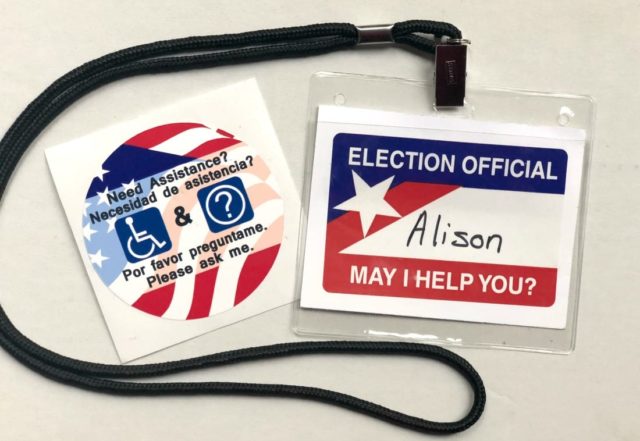
Every time I went to vote in an election, I wondered about the people working at the polling station. I recognized many from my community but didn’t know how they got that job so I did a bit a research. For many parts of this country, this role is known as a poll worker. This role in my county is called an election judge, and how you become one varies not just from state to state but by county. I decided to apply to be an election judge or official; now that I am self-employed, I can choose to “take off” Election Day and help at the polls.
I am updating this post in 2024, as I have now served as an election judge in Maryland for several general and primary elections and have also served as a judge for early voting. It's important to know what goes on behind the scenes to ensure you can vote in a secure and fair manner.
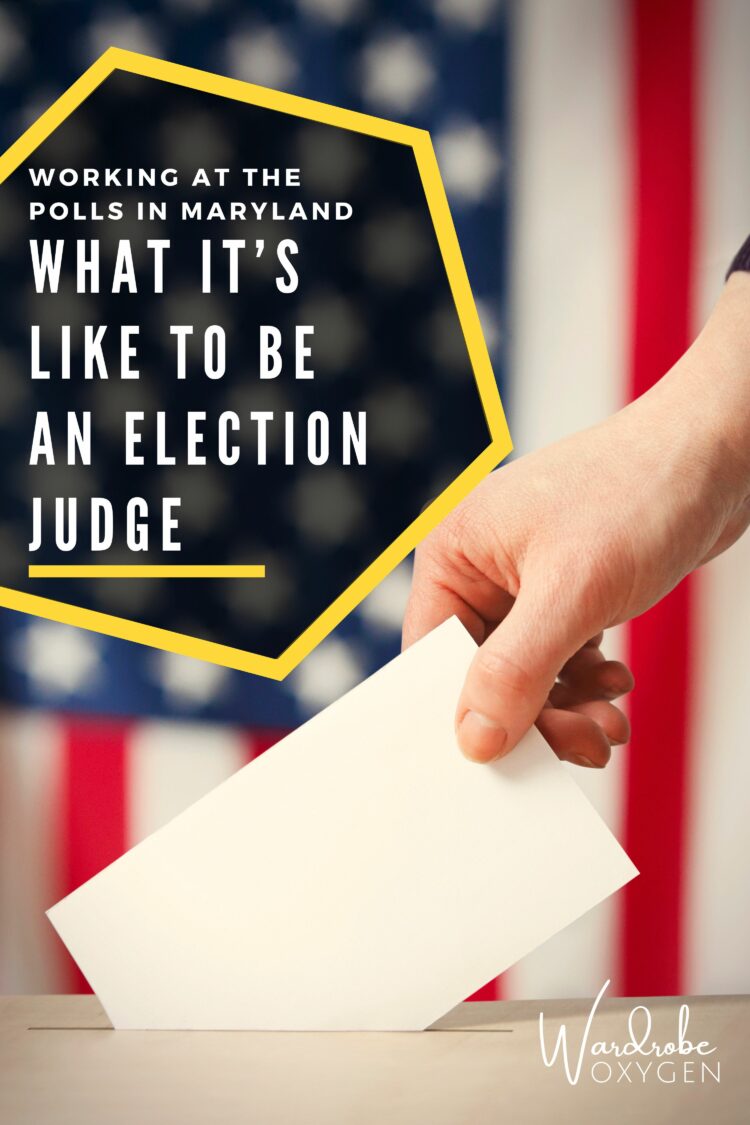
My Experience as an Election Judge
I live in Prince George’s County, Maryland. In this county, you apply online, and if they have an opening, they will contact you. You take a four-hour training and are required to work at the polling station for a couple of hours the night before Election Day and at least 14 hours on the actual day. You also agree to work for any general and primary election that happens in the year.
This four-hour training is repeated before every election. This means I have already taken this training about five times. The training slightly changes each time with updates to the process or the laws. We receive a handbook (it's a half-inch thick) to use as a reference when working at the polls on election day.
The Role of an Election Judge in Maryland
I live in a state with many laws to make voting accessible. However, this isn’t true for all of the country, so if you live elsewhere, your experience and responsibilities as a judge may vary.
The Night Before Election Day
The night before Election Day, we meet at the polling place around 6pm. Around bottles of water and a tray of cookies, we get to know one another and receive our Election Day assignments. There are around 14 of us at my polling location, two who are Chief Judges (the senior members of the group who manage us, one who is a Republican, and one who is a Democrat). After receiving assignments, we set up the room for election day.
We receive several large metal rolling carts from headquarters that have multiple locks on them. Inside are the tables and privacy screen for polling tables, the electronic ballot marking devices (BMD) for accessible voting, two scanning machines, the tablets to check in voters, and all the materials for voting (paper and BMD ballots, provisional voting materials, folders, etc.). There are many checks and balances, tamper-resistant tape with numbers to record, locks, and forms to ensure everything is counted and protected. This setup takes about two hours.
On Election Day
We return to our polling place at 5:30 am. We’re not allowed to leave the building while voting is taking place, so we all bring our meals, drinks, and creature comforts. I have now worked at multiple polling places and see that some set up a potluck for lunch, some bring coffee makers from home for all to enjoy, and sometimes a local group or the community firefighters or police order pizza or subs for us to enjoy. We've even had neighbors bring us treats in thanks (please know we are not to accept homemade treats).
We run reports to show there are 0 votes in our machines and tape them to the front door. We put out signage to notify folks this is a polling place and ensure campaigning is kept at the proper distance from the building.
Four individuals are assigned for check-in, two on the floor to manage lines, two at the station to get your ballot and to assist those who need the accessible voting machine, two who are scanning ballots, two managing provisional voters and anyone having an exception with their ballot, and the two Chief Judges who oversee the room, check in on us at our stations, deal with any issues, and when needed get on the floor to control crowds or allow judges to take breaks.
Working as a Provisional Judge in Maryland
In Prince George's County you do not choose what kind of election judge you are. I was assigned as a Provisional Judge when I signed up years ago. While I have now worked every roll as an election judge (except chief), I am still assigned as a Provisional Judge.
The Provisional Judge handles anyone who would vote provisionally. There are many reasons why one may have to vote provisionally, some of the most common:
- They aren't in their voting precinct (say they live in Prince George's County but are voting in Baltimore because that's where they work)
- They recently moved
- They wish to change their political party (this happens more in the primary elections)
- They ordered a mail-in ballot and didn't use it or lost it
There are around a dozen different reasons… it doesn't matter, your vote will be counted and you receive the same ballot as any other voter. Your ballot will just be hand counted to ensure it is valid. This also ensures that no voter can vote twice, no one can vote for a deceased individual… it essentially prevents any sort of voter fraud. While it may take up to two weeks to count all provisional ballots, they will be counted, especially in a close race.
If anyone accidentally filled out their ballot wrong, accidentally tore it, or for some reason, the scanner couldn’t read a page of their ballot, that voter comes to me as I am also the Exceptions judge. I provide a replacement ballot and “spoil” their original, record it being spoiled, and file it. There are many checks and balances to ensure there are no missing ballots and that every single completed ballot is accounted for.
On Election Day
Election judges are not to wear any political or issue-related attire or accessories. We are also to not wear any colors associated with a political party (no red, no blue, no green). We are to be in business casual attire, and comfortable shoes are recommended as it's a long day on a hard floor of a school gym or community center.
Doors open at 7 a.m., and there is usually already a long line of voters. We rarely have a moment without someone in line to vote, though 3 p.m. is usually the slowest point of the day. We often switch roles to allow folks to take breaks and meals, choosing those cross-trained and senior to be the replacements.
We either close the doors at 8:00 pm or note the last individual in line. Anyone who has shown up before 8 pm can vote, even if there's a line around the building. We will ensure every voter who arrives on time has the ability and plenty of time to vote.
After Voting Hours
After the doors closed, we still had a lot of work to do. We tally everything up, check it against other reports, and make sure everything is counted and matched up. We complete another report to tape on the door to show how many voters we had, and how many for different questions and candidates.
We pack up the booths, the machines, the signage back into those large rolling cabinets. A Closing Judge takes all the machinery with the poll results to headquarters where it is again counted, checked, and ensure everything is accounted for.
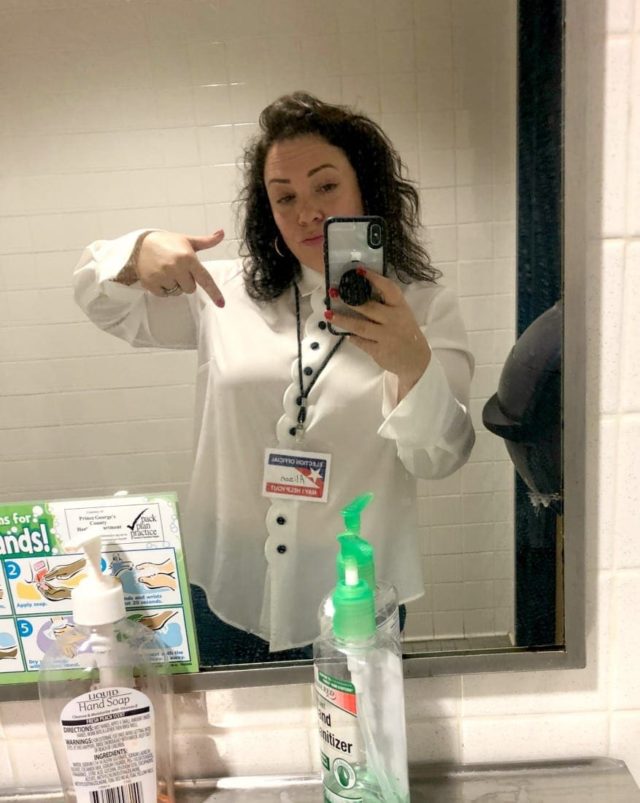
What I Learned as an Election Judge
The experience as an election judge was eye-opening. For years, I have stood in line, maybe quietly grumbling when it has taken a long time to vote, get my sticker, and head out. I never really noticed the staff or those around me voting, nor did I stop to think about how everything got set up in that room, which is usually a gymnasium, or how the votes got from the gym to the results on the TV screen.
When you check in to vote in my county, we use a machine that connects to Maryland voting information. We don’t ask for ID, but we do ask you to spell your name and confirm your address. We may ask for additional information to confirm we’re selecting the right person from the system, and there are processes to ensure people don’t vote twice or cause voter fraud.
In Maryland, if you applied for an absentee or mail-in ballot but didn’t use it, you can still vote on Election Day at the polls. If you show up at the wrong polling station, you can still vote. If your address changed recently, you can still vote. Provisional votes do count, but they aren’t counted on Election Night. They are tallied later and can help with tiebreakers. This sounds sketchy, but at my polling place, there were only a couple dozen provisional votes. The system is set up so that provisional votes should be minimal.
Maryland returned to paper ballots over a decade ago, not because they are cheaper or because the County was in the Stone Age, but because they are more accurate and tamper-resistant. If you are unable to fill out a paper ballot, each polling station has at least one touch-screen polling machine available. This is a ballot-marking device; you will not be voting electronically, but instead, a machine will mark a ballot on your behalf that will be scanned with the paper ballots.
If you are blind, deaf, unable to walk, unable to write, or in any other situation, you can still vote. Let us know when you check in, and we will make any and every accommodation to give you the right to vote. You can bring an assistant to help you vote; that individual will have to fill out a short form, but we welcome them.
Being an Election Judge isn't easy. It's an extremely long day, and it's emotionally taxing to assist so many different people. You can't even step outside for a quick walk or breath of fresh air, and you're suddenly BFFs with 13 people you hardly know for almost 24 hours straight. I now understand why, when I went to vote, the majority of the election judges looked bored, angry, or exhausted. I will be even kinder to them in the future!
Mean People Vote
You can often read a voter as soon as she or he enters the polling place. There were many who walked in, expecting the experience to be awful. They were tapping their foot and pointedly looking at their watch, loudly huffing while crossing their arms, purposefully speaking loudly to another in line about how slow and archaic the process was. We’d thank people for voting as they left and, half the time, receive a snarky response. At least a dozen times, I heard someone end their sentence to a judge with, “No thanks to you.”
A fellow judge was called a misogynist for asking a woman to put away her cell phone (you cannot use your cell phone, can’t even check a text while in a polling place). He asked a man just before her; he was asking everyone to put away their phones as he was instructed to do, and this woman yelled at him and asked to speak to the Chief Judge about his supposed sexism.
A man in a MAGA hat got up in my face and yelled that he needed an ID to buy a beer, an ID to buy a gun, an ID to use the community pool, but no ID needed to vote, and I was destroying America, and he’d have my job.
One judge asked another a question to confirm he was doing a process correctly, a voter yelled at him, called him boy and asked if the other judge wiped his ass for him too.
I had a lot of people yell at me because they were marked as provisional voters, and they felt that was wrong. I explained that we had no control over that, would give them the number to the Board of Elections, and told them that their provisional vote would still be counted, but they’d continue to call us names and tell us how corrupt the system was. A couple refused their right to vote because they were marked as provisional and stormed out.
The voting process in Maryland is not perfect, but it’s so much better than many other states and definitely better than many other countries. We are so lucky to have the right to vote, and where I live, we are so lucky to have it accessible. Where I live, I can easily walk to three polling locations. I know that in parts of this country, people have to drive hours to vote, and it floored me how rude and entitled many individuals were. But just like when I worked retail decades ago, I kept smiling and focused on those who needed and wanted help.
It's easy to get down about mean people, but the great ones were the majority. In general, people were happy. I saw many people tear up when submitting their ballot, so many people in fantastic t-shirts representing organizations they support, and multiple generations coming to vote together.
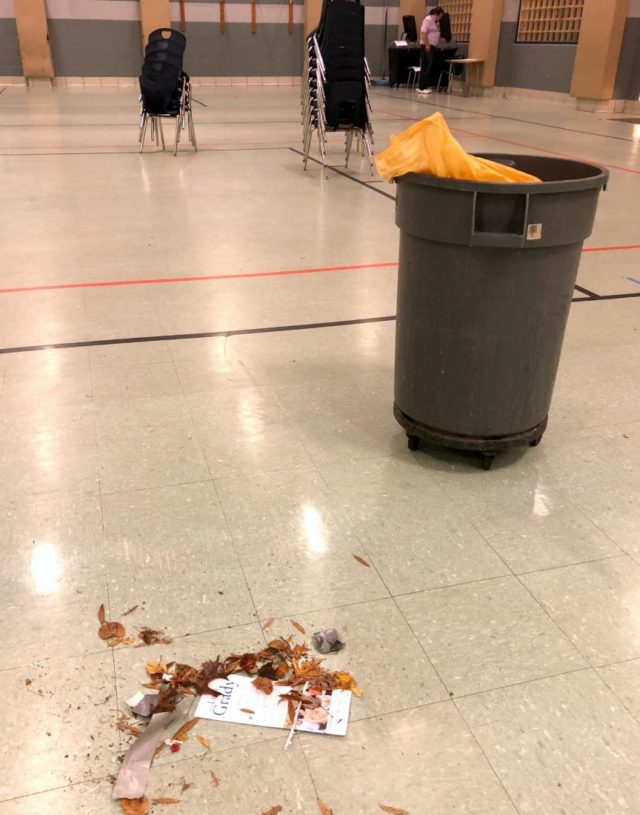
The Uninformed Voter
I heard two people discussing how a candidate ended the Rain Tax, and both of them didn’t understand what a Rain Tax was. The two of them, strangers before that day, both thought the government was taxing residents based on the amount of rainfall in a given year. They chose to vote for that candidate because they believed he reduced their personal taxes by eliminating the Rain Tax.
I heard people say they didn’t vote for someone because they thought the candidate looked like a pedophile, because they couldn’t tell what race they were, because they didn't like the look of the candidate's spouse, because the candidate wore an ugly suit to a debate, because their neighbor is voting for that candidate and he can never agree with his neighbor so the candidate must suck.
One year when Maryland was voting for its new governor, many voters didn’t know the political party of the current governor who was running for reelection. Even more didn't know the name of the person running against the governor.
As an election judge, I am not allowed to educate or even discuss the election and candidates, but sitting at that table, people forgot I was there, and I heard a lot of inaccurate and downright ridiculous information about the government, candidates, and the voting process.
Do Election Judges Get Paid?
Election judges are paid in my state. In PG County, we receive $50 for attending the training and $300 per election as long as we attend all three (training, the night before the meeting, and Election Day). Night judges who take the machinery back to headquarters receive an additional $100. Chief judges make around $100 more. For early voting judges, we make more but we also work at least four days.
During the day, we had voters encouraging the crowd to applaud us for volunteering or thanking us for volunteering. It was sweet but not quite accurate. It’s a very popular activity for the retired and underemployed because it provides a necessary bit of money along with social interaction and a sense of community.
Some people got so mad that they couldn’t vote quickly (it never took more than an hour, even during peak times) that they stormed out before actually voting. The polls are open from 7 am to 8 pm and there was a long period prior for early voting. Voting is so important that it’s worth planning according to your schedule.
If you arrive between 8-9 am, it will be a much longer line than if you arrive right at 7 am, or 3 pm, or even an hour before closing. In the future, consider early voting, which may offer a location closer to your place of work, will have shorter lines, and is even open on weekends.
This experience as an election judge made me realize it's not overkill to share information about voting. I saw many complain that there were too many ads on registering to vote or basic information about voting. However, on Election Day, I saw highly educated individuals not knowing the basics, and many people shared that their neighbors didn't vote because they didn't know how to register. If you have knowledge, share it. The worst you'll get is an eye roll, the best is you'll inspire another American to have his or her voice heard in the next election.
Voting Resources
Voting is a privilege. Many before us fought and died for our right to vote. It doesn’t happen often, and we’re notified well in advance before the day arrives, so there’s time to prepare. Below are some resources to help you be informed and prepare for Election Day:
- A list of the states that offer same-day registration: https://www.rockthevote.org/how-to-vote/same-day-voter-registration/
- Find your voting place: https://www.vote.org/polling-place-locator/
- Find out if you need an ID to vote where you live: https://www.voteriders.org/get-voter-id/
- If you need a ride to the polls: https://carpoolvote.com
- Don’t know which candidates to vote for? Visit this site where they will ask questions about what is important to you and help you choose: https://www.vote411.org/ballot
If you would like to help out for the next election, Google “how to be an election judge” and enter your state. The role has different names depending on where you live; some states call them officers or poll workers.
- For those who live in Maryland, please visit https://elections.maryland.gov/get_involved/election_judges.html
- For those in D.C., visit https://www.dcboe.org/Poll-Workers/Apply-to-be-an-Election-Day-Worker
- For those in Virginia, visit https://www.elections.virginia.gov/officer-of-elections/
This post was originally published in 2018.

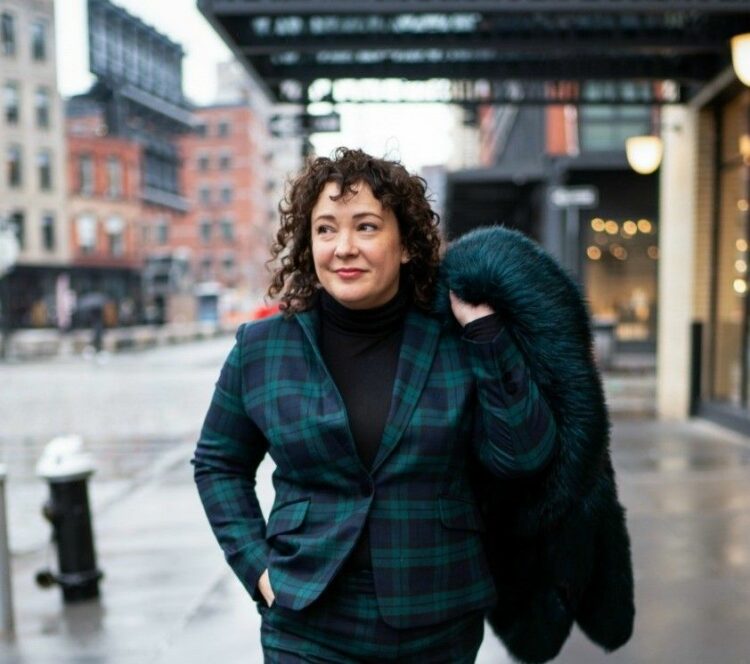
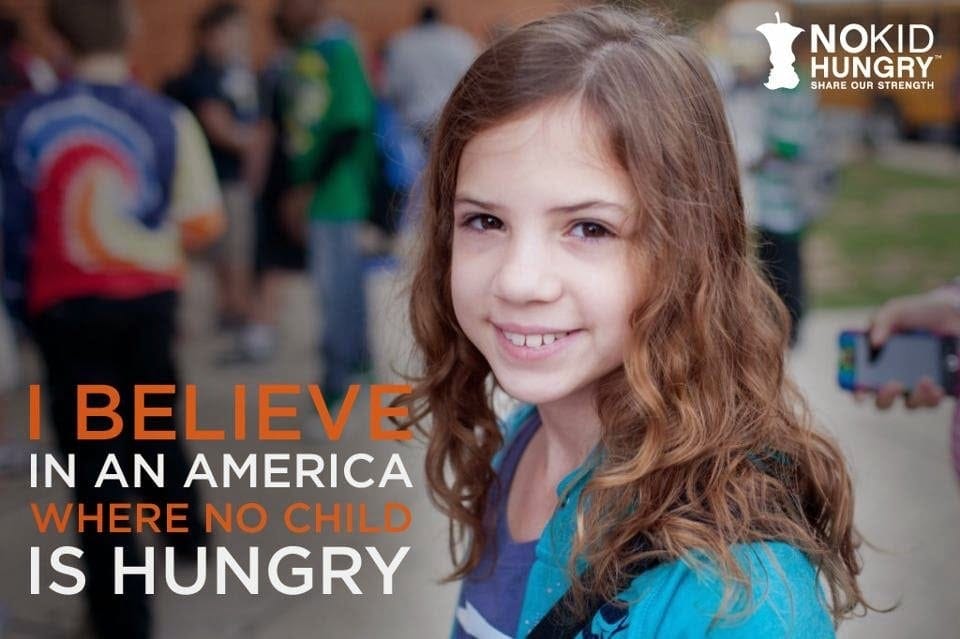
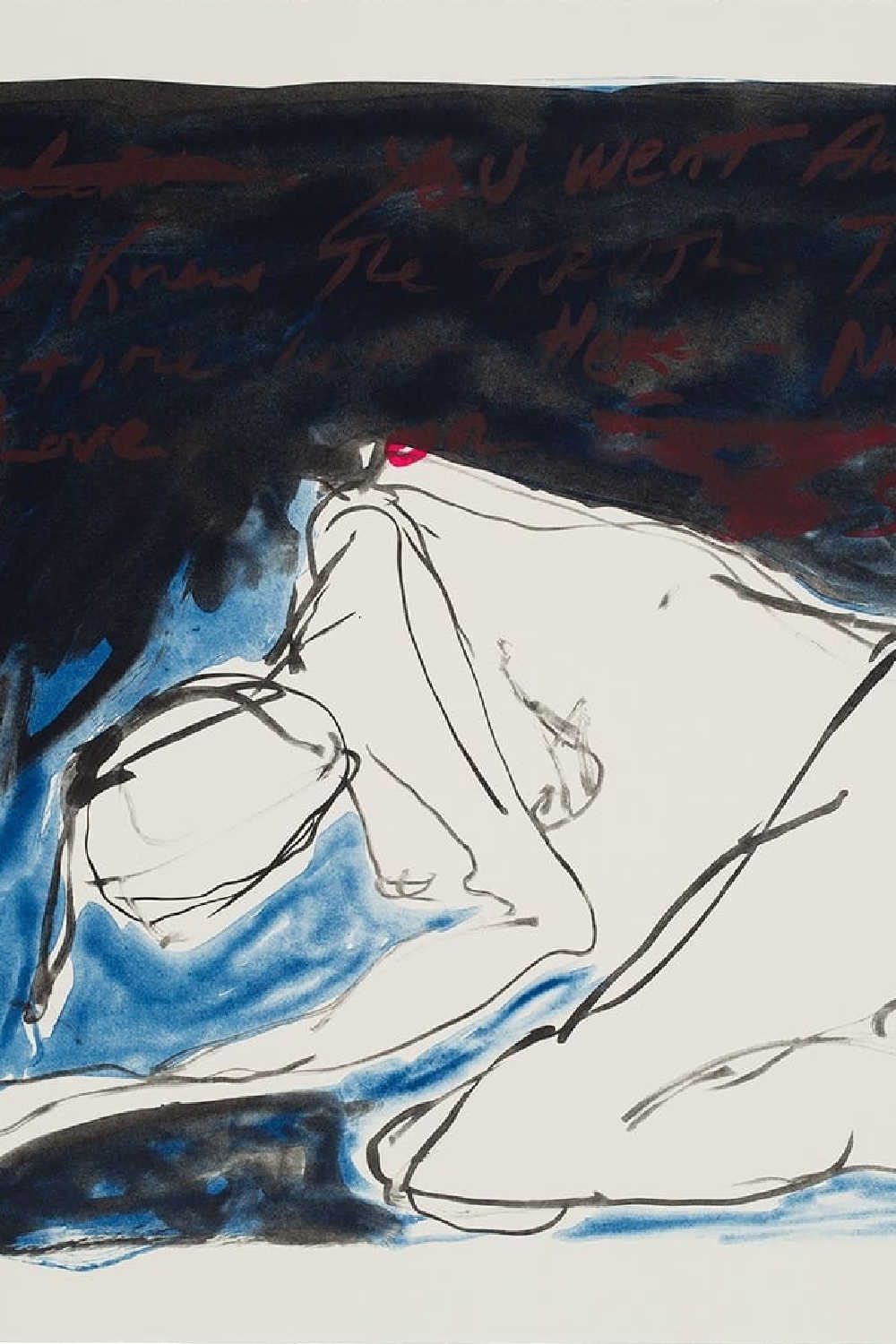
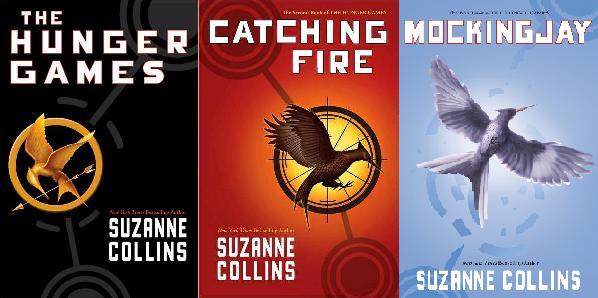
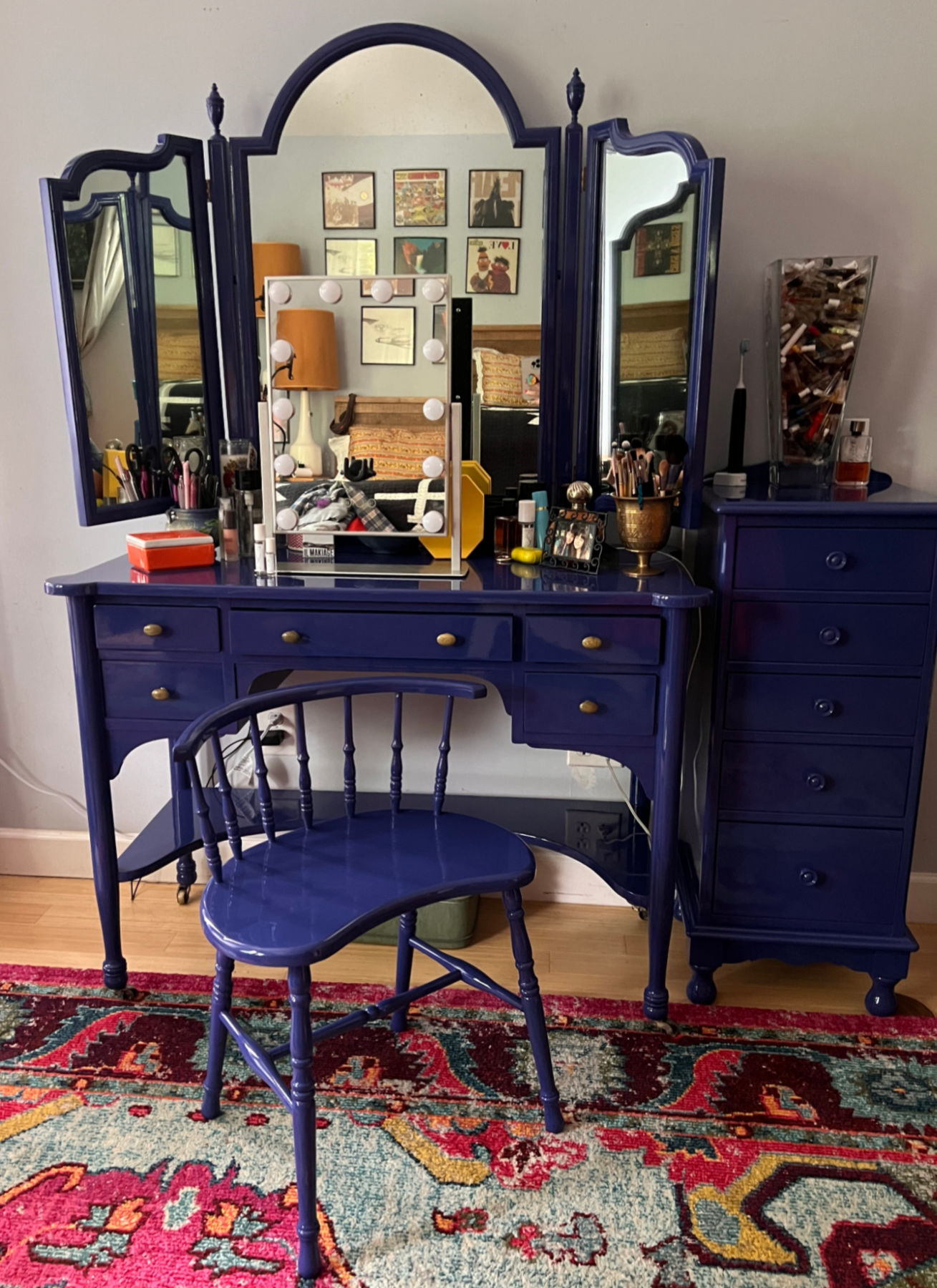
Thank you for all your posts on working the polls, including this update. You inspired me to be a poll worker this year in California. I wish I could maintain your positive outlook on working the polls; instead, after working the polls on Election Day only (though it was 6:30 am until almost 9:30 pm), I do not feel like doing it again. We were crammed into a too-small space that became chaotic and LOUD when we were busy (which was essentially the whole day) and made it hard to keep things organized. The level of rudeness and suspicion from voters at times was tough. I also realized how gendered it was–there we were, a crew of poll workers that was almost 100% female (except for the male poll manager) maintaining an constant level of kindness to keep the voters happy. It brought back a lot of my worst memories of customer-facing jobs as a teen. Especially now that we know the election results, I think I need to find a way to participate politically that makes me feel more active and empowering.
I am so sorry your experience was like that; it’s not surprising so much of this country is in need of poll workers! My friend did door knocking in swing states and said it was exhilarating and helped her see humanity in all. There are so many ways to get involved and I’m glad this experience didn’t turn you off forever!
Thanks for taking on this job, especially in this challenging year.
I did the full opening to closing as an observer in Pennsylvania and heard all the same nonsense and ignorance.
Today I’m just numb. I guess I should appreciate all the people trying to spread hope and encouragement but I’m old enough that I may not ever see a different President so it’s kind of hard to look on the bright side.
I’ve said this before. Alison you challenged and encouraged me to become a poll worker 2 years ago. It’s a very long day but so worth it… Community service at its best. I’ve not experienced the difficult people and situations you describe. At our poll some folks try to vote when they never registered, a few have gotten flustered and disappointed when they go to the wrong poll and others don’t understand when they are purged from the records when they vote only in presidential elections. I find the role of a poll worker that of an educator. Many people do not know the process in their state/community. I’m tired today but feel grateful for the opportunity to vote.
Thank you so much, Linda, for your service! I’m honored to be the catalyst; may you be the catalyst for another!
Thank you so much for this information, and background information. It’s eye opening to hear why people vote , neighbors, looks, etc.. how sad. I guess we need more education, and probably better manners..
I vote early, by mail in California , but I’m glad in person is available. Thanks.
I’ll pretend to give you yummy cookies..
Thank you for your work at the polls and your work to educate. Voting is both privilege and responsibility, and both the structure (i.e. you at the polls) and the information (i.e. you writing this post) support its exercise.
I’m fortunate to live near my polling place and can walk to cast my vote. I cut cross the school playground, go down the steps, past the last of the campaign signs and stickers, and in through the school doors and hallways to the cafeteria-become-polling-station. I am touched to tears at the process of voting, the idea of this whole in-gathering. Some years the sidewalk is chalked with colorful designs done by the students the last prior school day, and the chalk pictures keep the children also in my mind, a bright reminder that the community is larger than those showing up to vote this particular day.
Thank you for your informative and thoughtful post! I just got my first poll worker assignment in NY and I’m excited but unsure of how long the day will feel. That’s when I found your post.
Amazing post! Just wanted to say that it’s this type of content that keeps me coming back to your site. I’m not petite, or plus-sized, or over 40 (though not far from it), and I live in a warm climate. While I appreciate your style posts, there are other fashion bloggers whose wardrobe suggestions are far more applicable to my body type and lifestyle. But, your blog has been one of my most read for years now because I love your voice, your transparency, and your commitment to supporting your values through your work. Thank you!!
Thank you for doing this important service Allie! And you make it sound interesting with your behind the scenes info. I personally love our vote by mail system in Oregon. No physical polling places that can limit peoples’ accessibility, and plenty of time and quiet space to vote. I hope more states adopt this system.
I enjoyed this information, Allyson. Most of all I appreciate that you shared without being “political” in sharing your experience. Every vote is important whether you agree with the voter or not. Thank you.
Coincidently, when I left the polls this morning I thanked the people staffing the polling place (which I hear a lot of others do – thankfully, I’ve never heard anyone be rude, as you experienced—so appalling — but maybe because l’ve rarely experienced a line) and one of them told me that they need help, so I gave my contact information for a future election. So, very timely to read your post about your experience. I’m sometimes not up on the candidates for the more obscure posts, but very disturbing to hear about how uninformed some of the voters were. My grandmother marched alongside Eleanor Roosevelt for suffragette rights, so I feel a special obligation to vote. (And I feel pretty proud, too!) Thanks, Alison!
Interesting and helpful post. I got involved way back in the 2012 election and considered becoming an election judge but didn’t go through with it. (Too busy! And I think in my state the pay was $9/hr, not that that mattered.) Even so, attending the BPOUs and hearing what people thought and cared about was really eye opening.
For me, the biggest takeaway from that experience was that the people that get involved at the grass roots level really CAN make a difference in what happens. That’s where the nuts and bolts of governing happen! It was a totally different experience than merely talking to the average citizen informed by cable news. There’s often a huge gulf between what we think we know and what’s actually going on. I found it humbling, and it changed my views tremendously.
Glad you did this! I always try to be super-courteous to the poll workers bc I do appreciate what they’re doing to facilitate us taking part in elections. Voting is a precious right, and I wish more people thought of it that way and took the trouble to do it. If I ever retire, I will look into working the polls, among other volunteer activities that seem like they’d be fun and/or rewarding.
You looked extremely cute in your outfit that day!
Great, post. I appreciate the information.
I very much enjoyed this look inside a polling place on Election Day. Thank you.
Thank you for working the election. This is a great post – very educational. I’m so excited that our 18-year-old is coming home from college this weekend for Spring Break and will vote (early) for the first time!
You ARE amazing.
I remember when you originally published this & I’m glad to see it again. Thank you for taking on this important role! It’s great that your state tries so hard to make sure people can vote. Your experiences were interesting; a bit sad too. It’s such a shame that people can be so rude at times. We’re all busy but we should show common courtesy to one another. Anyway, let’s hope people exercise their right to vote today!
Thanks for sharing this! I really didn’t have a good feeling of what election judges did, but I’m glad I do now!
I’m glad you found it informative!
I grew up in PG County Maryland but moved to the Twin Cities in 1999. I remember going to vote with my parents as a kid and it always took forever, an hour or more, and seemed super complicated with all of those levers.
I’ve only ever voted myself in MN and I’m always prepared for it to take an hour or longer based on my childhood experience. However, the longest it’s ever taken me is 15-20 minutes, and that’s been in big elections like 2008 and 2016 and the state is known for high voter turnout. This year it took me about 5 minutes. Most midterm and off-year elections I can walk in and walk out without any waiting at all. We’ve always had paper ballots here.
It always boggles my mind how fast voting goes here (and I’ve never seen anyone rude or grouchy – but then, I’ve never been there that long either so maybe I just miss them?) and that it can take hours in other states… the ones where the news stories report that people are waiting in line for hours and the polls are closing.
It definitely isn’t equitable and it certainly discourages people from voting. I couldn’t imagine waiting in line for hours to vote if I had a chronic pain condition or a newborn to care for. I’m not sure what is going on in other states such that it takes so long to vote. It just seems so strange.
Wow. I’m not sure if I should feel appalled or just sad at the rudeness of some people in this country. I have said for a long time that voting is not just a right, but a duty. And part of that duty is to be an INFORMED voter. Thank you for sharing your experience and giving us all a peek behind the scenes.
My pleasure, I think the more people know what it takes for voting to happen maybe the more they will respect the process.
I’ve worked as a poll worker in British Columbia and one of the rules on election day is that no campaign material can be displayed in the polling place or within 100 meters of the entrance. I’m curious whether the same law applies in Maryland because you mentioned one man wearing a MAGA hat and other voters wearing t-shirts from specific campaigns. (These items wouldn’t be allowed since they are considered campaign material.)
We as poll workers weren’t allowed to wear red or blue or have anything that showed our preference. Polling material and marketing has to be a certain distance from the building. You’re not supposed to wear anything promoting a specific candidate, but wearing things like MAGA hats or Women’s March shirts are allowed because they aren’t technically specific to a candidate.
I was an elector in the last federal election in BC, and we were told we weren’t even allowed to wear colours that could be construed as support for the different parties (ie red for Liberals, blue for Conservatives, etc). And saw a lot rudeness at polling stations that were super busy which wasn’t great as the previous gov’t had changed the rules for id to prove your address and identity. 🙁
Thank you for sharing your experience as an election judge! Regardless of the fact that it is a paid position, it is important work and I appreciate you doing your part as well as telling your readers about it. I find it interesting to read about experiences in other states. I’m in Hawaii, and have only had to wait in line to vote once (and really, that time i only waited about 10 minutes). Although unfortunately, we don’t have the greatest voter turnout, which might have something to do with that!
While it’s not for good reasons, this election has really brought to light the differences in the voting process from state to state and it’s been interesting to learn about how each state does it!
Hi Alison, Thanks for this very interesting post. I’ve worked on a number of elections in the province of Ontario, Canada, and was intrigued to learn about the differences in our voting systems. I didn’t know what provisional ballots were – we don’t have them here – and unlike your state, our voters have to show ID which proves that they’re who they are, and also where they live. We don’t have much on-line voting yet, and no mail-in ballot systems. I certainly recognize some of the ‘types’ you describe!
One point that really struck me was the one about uninformed voters. I read a bit too much about American politics these days (lol) and am aware of the many voices before the midterms encouraging people to get out and vote – what I’d like to see added to that is encouragement to get out and vote as an INFORMED voter. Find out about the local candidates and their policies, find out about the issues and how they might affect you and your life, and THEN go vote.
A good point, but I think for a lot it’s hard to find the information. This election, our ballot was three pages long. I consider myself an informed voter but some things on there I had not known prior to voting that they would be on the ballot and I had to make a decision based on the paragraph they offered about it. Materials that arrive in the mail are paid for by a certain party or politician, and with more and more news deserts in our country it’s hard to get information on smaller issues like funding for roadways or changing term limits. The best thing is for us to be as informed as possible and share what we’ve learned with others. That and with encouraging people to actually vote may inspire them to do research on their parts and see their vote matters and shouldn’t be taken lightly.
The League of Women Voters has an incredibly useful resource where you can see what will be on your ballot before you vote: https://www.vote411.org/ballot
Not only does it list the questions/initiatives that will be on your ballot and the candidates, it often has statements from those candidates on various key issues so that you have their positions in their own words, no spin or bias from whatever news source. I used it to look up a few lesser-known races in my town the day of the election and it was hugely helpful.
Wow, Alison, this was a fantastic, educational post. I always wondered what it was like to be an elect judge, and now I know! I always make sure to thank the people working in my polling place, and now I will be doubly sure I do.
I am glad we have paper ballots where I live, in Arizona. It does feel more tamper proof. And I felt my vote was more important than ever this year. I am so happy with the results finally announced last night in our Senate race!!!
Thank you for your service last week, and for this post.
Thanks Linda!
This was the first time in years that I couldn’t work at the polls–and I missed it; thanks for the nostalgia! I’d second everything you said; in Virginia, one can either be a full-on volunteer or get paid; while I originally signed up in a fit of patriotism, halfway through the day, I decided that I was earning the money and might as well take it! If it’s any consolation, in Virginia, we get yelled at both for requiring photo IDs and for providing voter registration cards that aren’t valid at the polls–so both sides of that argument.
Which might be why I cheerfully voted this year with a school ID card, to the dismay of the poor poll worker with a system set up for drivers’ licenses. But I was nice!
LOL! Thank you for doing this job, I love that you used a school ID!
Alison~ I know you have a million things going on, so I really admire that you did this, and took the time to share such a comprehensive summary of your experience. I’ve always wondered what it’s like to be a poll worker, but never looked into it. This is one reason I love your blog- so grounded and real.
Thank you Christy!
Really interesting to get an insight into how the election process works in the US. I’m in the U.K and the impression we’ve been getting in the press here, is that it’s really hard to vote, with lots of hoops to jump through.
I work in local government in the U.K. We can volunteer to work as an election clerk. We have to use a days leave to do the role and then get a flat rate of about $200 to work on the day. Everyone who counts the ballots also gets paid.
The whole process must be so much harder over there given the size of the country.
Each state is different. I understand letting states manage certain things so they can do what is best for their population, geography, etc. But when it comes to voting, there are so many sketchy laws and policies I wish it was fair across the board.
Thank you for volunteering! My mom was a frequent poll worker when I was growing up in California. I live in Seattle now, and King County is an all mail-in ballot county. This year they found the budget to support return envelopes that didn’t require postage, which was great as that had been a barrier for many people in the past. Ballots are sent weeks prior to the election and early voting is encouraged though you can use centrally-located drop boxes until 8PM on election day. But there is a lot of encouragement to get your ballot in early to help get results tallied early, too. Filling it out at home and being able to refer to the voting guide and go online to research referendums has been really nice!
What a fantastic method for voting in your state! It’s a very modern manner, considering how life is these days and I love that they now offer postage!
Allison – thanks for sharing your experience. Eye opening and inspirational.
It’s my pleasure!
Thank you for working the election (paid or not, it’s still hard work that’s important to our democracy!) & thank you for this post. Every single election is vital, from president down to city council. I wish more Americans took it seriously.
I hope the positive turnout of this election will inspire more to take it seriously.
Thank you for doing this important work. I worked as a poll checker (A member of one of the parties who listens for voter’s names being called out (a legal requirement in my state) and marks down who voted. This allows parties and candidates to identify who to target for their GOTV (Get Out The Vote) campaigns) for both the primary and general election this year. The poll workers at my polling place were dedicated and enthusiastic. My polling place is in the large garage of a firehouse. It was freezing for the general election. I only spent 3 – 4 hours there and I couldn’t wait to leave. The poll workers were stuck there all day and didn’t complain. They were courteous to everyone. I can’t thank you and them enough.
Thanks Bethany!
I was also a first-time poll worker (“Election Inspector” in my state) and like you – it was an eye-opening experience! Encourage everyone to read up on their area’s rules and policies, and if anything doesn’t make sense, talk to a poll worker or your local representatives about why things are set up that way. All of the angry people should sign up to do the work – same for anyone claiming concern about voter fraud.
Thank you for signing up for this important role!
Thank you for this excellent, well written article. I too am a Poll Worker. I work in Central Florida in an area that is very traditional and conservative. Our crew has worked together for 14 years so we work like a well oiled machine. Residing in Florida means we get paid much less than you do and voting is much more difficult for the voters. During the Primaries we had rude voters just as you mentioned. Due to record breaking early voting, the day of the November election had lighter turnout than expected. The biggest surprise was how nice voters were to all of us! Gone were the angry voters filled with rage. We had the best Poll Worker experience on November 6 than in previous years. I HIGHLY recommend everyone give it a try. Not only do you get paid but you learn first hand exactly how your city, county and state run elections. There is a ton of false information going around today about fraud but we know it’s not true.
thank you so much for being a poll worker!
Bravo! Thank you for being there, and for telling us about it. Such great information, and so inspiring!
Thanks Liz!
I had no idea that in some states, you can’t take your phone out in the voting booth! I’m in MA, and always look at my phone because I use vote411.org to create a personal ballot to refer to. For anyone else who’s interested, here’s a breakdown of cell phone rules by state: https://www.bustle.com/p/can-i-use-my-phone-while-voting-all-the-rules-you-need-to-know-about-10169489
Thank you for this link! We had signs at the doors and throughout the room, but it’s so unexpected to not be able to use your phone somewhere, we had to remind people. They told us the reason is privacy, so there’s no photos of people voting or their ballots. When I told people that they were usually understanding. We’d hand over scrap paper and a pen to let them transcribe their info before heading into line. I knew in Maryland I couldn’t take a booth selfie or ballot selfie but had no idea before being a judge that phones and cameras in general were not permitted. This was such an informative experience!
You can’t take a ‘ballot selfie’ in Illinois, Florida, or 25 other states. Many consider this law unenforceable and therefor ineffective. In Florida voters could use their phone to look at photos they had taken of their choices but they could not talk on their phones. Discussing politics in the polling area is also strictly forbidden. We had to ask many couples to stop telling their partners how to vote. One woman screamed at us, ” I’ve been telling him what to do for 25 years and I’m not about to stop now!” We did counsel her and she tried to keep her mouth shut after that. It would be helpful if each county in the state had the same rules as well as each state had the same voting procudeures.
I agree, it’s hard to enforce rules when people don’t know about it and it changes from state to state!
No offence but that woman’s response makes me really feel for her husband – imagine not only feeling that way about your life partner but to also think it’s OK to talk about them like that in public! I wonder if she was even hearing herself when she said it.